
INDO-IRANIAN JOURNAL
Scope & Guideline
Fostering Rigorous Discourse in Diverse Disciplines
Introduction
Aims and Scopes
- Indo-Iranian Linguistics:
The journal emphasizes research in Indo-Iranian linguistics, including syntax, semantics, and phonology, exploring the connections and distinctions between various Indo-Iranian languages. - Historical and Comparative Studies:
It publishes comparative studies that investigate the historical development of Indo-Iranian languages, drawing connections between ancient and modern forms. - Cultural and Religious Texts:
The journal features studies on religious and philosophical texts from Indo-Iranian traditions, including Buddhist, Hindu, and Jain literatures, contributing to the understanding of their cultural significance. - Interdisciplinary Approaches:
The INDO-IRANIAN JOURNAL encourages interdisciplinary research that integrates linguistics, history, art, and archaeology, fostering a deeper understanding of Indo-Iranian heritage. - Translation and Textual Criticism:
It includes critical editions and translations of primary texts, providing valuable resources for scholars and students of Indo-Iranian studies.
Trending and Emerging
- Digital Humanities and Textual Analysis:
Recent publications indicate a rising trend in the application of digital humanities tools for textual analysis, enhancing the study of Indo-Iranian manuscripts and inscriptions. - Intertextuality and Influence:
There is an increasing focus on intertextual studies, examining how Indo-Iranian texts influence each other across different genres and historical periods. - Cultural Narratives and Identity:
Research exploring the narratives of identity within Indo-Iranian cultures is gaining traction, reflecting broader societal interests in how cultural heritage shapes contemporary identities. - Cross-Cultural Exchanges:
Emerging studies are focusing on cross-cultural exchanges between Indo-Iranian and other cultural traditions, highlighting the interconnectedness of historical narratives and cultural practices.
Declining or Waning
- Modern Literature Studies:
There has been a noticeable decrease in studies focusing on modern Indo-Iranian literature, suggesting a shift towards historical and classical texts rather than contemporary works. - General Overviews of Indo-Iranian Culture:
Papers providing broad overviews of Indo-Iranian culture are becoming less frequent, indicating a trend towards more specialized and detailed studies. - Comparative Mythology:
Research on comparative mythology within Indo-Iranian contexts appears to be waning, as scholars may be prioritizing more specific linguistic or textual analyses. - Linguistic Pedagogy:
While discussions on language teaching methodologies were once prevalent, there is a decline in articles addressing the pedagogy of Indo-Iranian languages, suggesting a narrowing of focus in practical applications.
Similar Journals

Slavia-Casopis pro Slovanskou Filologii
Exploring the Depths of Slavic Linguistic HeritageSlavia-Casopis pro Slovanskou Filologii is an esteemed journal dedicated to the advancement of Slavic philology, published by the SLOVANSKY USTAV AKAD CESKE REPUBLIKY in the heart of the Czech Republic. With its ISSN: 0037-6736, the journal serves as a vital platform for scholarly exchange, embracing a rich academic tradition since its convergence years beginning in 2002. The journal has achieved notable recognition, with a Q3 ranking in Linguistics and Language and a Q2 in Literature and Literary Theory as of 2023, highlighting its contribution to these dynamic fields. Although it does not currently offer open access, its rigorous selection of articles ensures that it remains a crucial resource for researchers and practitioners alike, facilitating a deeper understanding of Slavic languages and literature. Scholars benefit from the journal's extensive research backdrop, enhanced by its current ranks in the Scopus database, underscoring its significant placement within the academic literature landscape. The editorial scope of Slavia promotes innovative inquiries that reflect cultural, historical, and theoretical perspectives endemic to Slavic studies, making it indispensable for professionals, students, and enthusiasts invested in the exploration of Slavic linguistic and literary heritage.
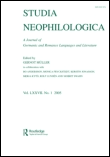
STUDIA NEOPHILOLOGICA
Unveiling the Nuances of Linguistic ThoughtSTUDIA NEOPHILOLOGICA, published by Routledge Journals, Taylor & Francis Ltd, is a distinguished periodic publication that has been contributing to the fields of Linguistics and Philosophy since its inception in 1928. With an ISSN of 0039-3274 and E-ISSN 1651-2308, this journal is recognized within the academic community as an essential platform for innovative research and scholarship. It currently holds a Q3 quartile ranking in both Linguistics and Philosophy categories for 2023, further illustrating its relevance in a competitive landscape, where it ranks #465 out of 1088 in Scopus Ranks for Language and Linguistics. Although not openly accessible, the journal provides vital insights and analyses that push the boundaries of understanding language and its philosophical implications. With a coverage spanning from 1928 to 2024, STUDIA NEOPHILOLOGICA is indispensable for researchers, professionals, and students eager to expand their knowledge and engage with critical discussions in these disciplines.
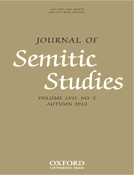
JOURNAL OF SEMITIC STUDIES
Connecting Scholars through Semitic ScholarshipJOURNAL OF SEMITIC STUDIES, published by Oxford University Press, is a premier academic journal that has served as a vital platform for interdisciplinary research in the fields of Semitic languages, history, culture, and religion since its inception in 1956. With a distinguished impact factor and a significant presence in various academic quartiles, including Q1 rankings in History and Literature, this journal is essential for scholars and practitioners seeking to advance their understanding of Semitic studies. The journal's scope includes comprehensive research articles, critical essays, and reviews that contribute to ongoing dialogues in Cultural Studies, Linguistics, and Religious Studies, making it indispensable for researchers, educators, and students alike. Although it currently does not offer open access, the high-quality, peer-reviewed content ensures rigorous academic standards while maintaining engagement with current trends and discussions in its respective fields. As a hub for innovative and influential scholarship, the JOURNAL OF SEMITIC STUDIES continues to foster an environment that encourages exploration and discovery within the rich tapestry of Semitic languages and cultures.

Caplletra
Advancing Open Access Scholarship in LinguisticsCaplletra is a distinguished open-access journal dedicated to the field of linguistics and language studies, published by PUBL ABADIA MONTSERRAT since its inception. Based in Barcelona, Spain, this journal has been a vital resource for researchers, professionals, and students engaged in the intricate explorations of language and its applications since its transition to open access in 2005. Despite its current quartile ranking of Q4 within the Linguistics and Language category as of 2023, Caplletra continues to serve as an inclusive platform, fostering a dialogue that encourages a diverse range of scholarly contributions. Covering an expansive scope in the converged years from 2018 to 2024, it plays a crucial role in disseminating innovative research and insights. With its ISSN 0214-8188 and E-ISSN 2386-7159, Caplletra is committed to making academic work accessible to all, enhancing the landscape of linguistic scholarship and reflecting the evolving nature of language studies.
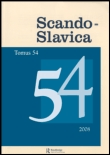
Scando-Slavica
Illuminating the Rich Tapestry of Scandinavian and Slavic ScholarshipScando-Slavica is a renowned academic journal published by ROUTLEDGE JOURNALS, TAYLOR & FRANCIS LTD, specializing in the rich interplay of Scandinavian and Slavic studies. With its ISSN 0080-6765 and E-ISSN 1600-082X, the journal has been a critical resource for scholars since its inception in 1954, covering a wide range of disciplines including archaeology, cultural studies, history, linguistics, and literature. As of 2023, it has consistently ranked in the third quartile across various categories, indicating its influential role in disseminating innovative research within the arts and humanities. With a focus on interdisciplinary dialogue, Scando-Slavica aims to foster a deeper understanding of cultural exchanges and linguistic connections, making it an essential read for researchers, professionals, and students interested in exploring the complexities of Nordic and Slavic interactions. While currently not an open access journal, its contributions have garnered substantial citations, bolstering its academic impact and relevance in a diverse scholarly landscape.

BULLETIN OF THE INSTITUTE OF HISTORY AND PHILOLOGY ACADEMIA SINICA
Fostering Dialogue Across Time and Language.BULLETIN OF THE INSTITUTE OF HISTORY AND PHILOLOGY ACADEMIA SINICA is a distinguished academic journal published by the Academia Sinica's Institute of History and Philology, based in Taiwan. Focused on the interdisciplinary fields of history, linguistics, archaeology, and religious studies, this journal provides a scholarly platform for researchers and professionals seeking to disseminate innovative findings and theoretical advancements. Despite its recent Q4 categorization in several areas including archaeology and linguistics, the journal is committed to fostering rigorous dialogue and enriching the academic community's understanding of historical and philological nuances. As an essential resource for those invested in the humanities, particularly within the context of Asian studies, it remains dedicated to enhancing visibility and accessibility to pivotal research. While currently not an open-access publication, it continues to shape the discourse within its field through concise contributions from credible scholars. Join the journal's ongoing mission to illuminate the complexities of history and language, bridging gaps across cultures and time.
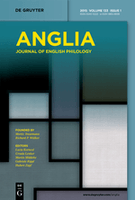
ANGLIA-ZEITSCHRIFT FUR ENGLISCHE PHILOLOGIE
Illuminating the Path of English Linguistic ResearchANGLIA-ZEITSCHRIFT FUR ENGLISCHE PHILOLOGIE, published by WALTER DE GRUYTER GMBH, stands as a significant periodical in the fields of Linguistics and Literary Theory. With a rich publication history dating back to 1878 and ongoing contributions until 2024, this esteemed journal serves as a vital resource for researchers, professionals, and students interested in the evolution of the English language and literature. Although it does not currently offer open access, its rigorous peer-reviewed articles have secured a respectable standing, ranking Q3 in Linguistics and Language and Q2 in Literature and Literary Theory as of 2023. The journal, located in Berlin, Germany, continues to drive academic discourse and foster scholarly engagement in the intricacies of English philology, making it an essential platform for the latest research and developments in the field.

Cuadernos de Filologia Clasica-Estudios Griegos e Indoeuropeos
Exploring the Roots of Language and CultureCuadernos de Filologia Clasica-Estudios Griegos e Indoeuropeos, published by Universidad Complutense de Madrid, serves as a vital platform in the fields of Classics and Linguistics. With an ISSN of 1131-9070 and an E-ISSN of 1988-2637, this journal showcases rigorous academic research that spans both Greek studies and Indo-European linguistics. Recognized within the Q1 quartile in Classics and the Q2 quartile in Linguistics and Language, it highlights its standing among peers in these disciplines, particularly reflecting its commitment to advancing scholarly conversation. Though currently lacking in Open Access options, its emphasis on quality content ensures it maintains an intellectual influence, as evidenced by its ranking of #112 in Classics and efforts to engage researchers and students alike. The journal's coverage from 2011 to 2024 positions it as a rich historical resource, while its address in Madrid places it at the heart of European classical studies. By offering insights into the fundamental aspects of language, literature, and ancient cultures, Cuadernos de Filologia Clasica remains a critical resource for those seeking to deepen their understanding of the classical world and its enduring linguistic legacies.
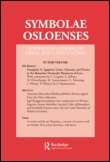
Symbolae Osloenses
Exploring the Depths of Ancient WisdomSymbolae Osloenses, published by TAYLOR & FRANCIS LTD, is a distinguished journal in the field of Classics, with a rich history dating back to its inception in 1922. This UK-based journal has continuously contributed to the scholarly discourse surrounding ancient cultures, languages, and literature, making it a crucial resource for researchers, educators, and students alike. Though it operates under a subscription model, its impact on the academic community is underscored by its recent inclusion in the 2023 Scopus rankings, where it holds a respectable position in the 65th percentile among its peers. With decades of published research spanning from 1924 to 2023, Symbolae Osloenses remains committed to fostering robust academic dialogue and advancing knowledge in the Classics, catering to a diverse readership seeking to explore the nuances of classical studies.

Minerva-Revista de Filologia Clasica
Illuminating the legacy of antiquity through research.Minerva-Revista de Filologia Clasica, an esteemed academic journal published by the Universidad de Valladolid, is a pivotal resource in the fields of Classics, Linguistics, and Literature. With its ISSN 0213-9634 and E-ISSN 2530-6480, this journal has been championing open access since 2017, making high-quality research accessible to a global audience. Based in Valladolid, Spain, Minerva is dedicated to the exploration and dissemination of scholarly work related to classical philology, offering a platform for the exchange of ideas among researchers, educators, and students alike. Recognized in the 2023 category quartiles as Q3 in Classics and Q4 in Linguistics and Language, this journal provides valuable insights and contributes significantly to its fields, allowing authors and readers to engage with important discussions and innovative perspectives. As the academic landscape evolves, Minerva continues to adapt, fostering a vibrant community committed to the advancement of knowledge in antiquity and its linguistic dimensions.